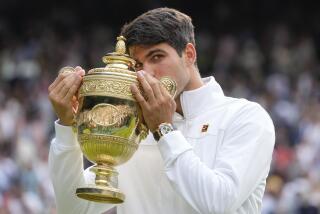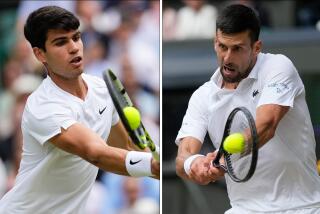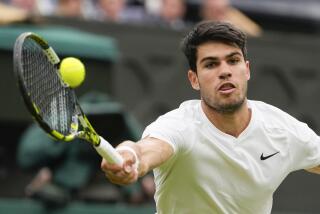Wimbledon--Where Grass Is Always Greenest
WIMBLEDON, England — It will surely rain. There undoubtedly will be a row with a gate guard who is entirely unsympathetic to the fact that Boris Becker or Martina Navratilova forgot to bring the proper pass. It is all part of the Wimbledon mystique, the courtly style and the chaos, and quick, somebody teach 14-year-old Jennifer Capriati how to curtsy.
“I can’t do it, because I don’t know myself,” said her father, Stefano.
The rules are ancient and sometimes seem arbitrary and the trophy is taller than the Duke of Kent’s top hat. The answer to every reasonable question is the unreasoning reply, “Because it’s Wimbledon.” Why don’t the matches start before 2 p.m.? Because. Why don’t they play on the first Sunday? Because. Why don’t they allow the fans to take their shirts off when it’s hot? Because. It’s Wimbledon, drenched in champagne and berries, lager and sausages, and the heady smell of mown grass.
The All England Club can be ridiculed, with its sometimes preposterous insistence on rules at the cost of order. Or it can be ignored, as 20-year-old Andre Agassi has done for three years, saying it simply doesn’t fit into his schedule and the U.S. Open is more important. But Wimbledon is unique and prestigious. Not only as one of the Grand Slam events, along with the Australian, French and U.S. opens, but for itself. And, if players alternately loathe and adore it, they almost universally covet it.
Above all, Wimbledon is an atmosphere. It is the last of the Grand Slam tournaments to be played on a lawn, a mood piece that can make the most unemotional player lapse into lyricism or dark superstition. It is the one great victory No. 1 Ivan Lendl lacks, and the one that counts most for posterity. At 30, his opportunities fewer, Lendl skipped the French Open and numerous other events to sequester himself first in Australia and then in London to hone his game on the sleek surface that always makes him feel ungainly.
“I have one ambition left in my life,” he has said. And it is winning Wimbledon.
Eight-time champion Navratilova makes an annual pilgrimage to Centre Court just before the championships begin. Last year she laid on the lawn and ran her hand over it, then pulled up three blades and a couple of pebbles for good luck charms, while coaches Billie Jean King and Craig Kardon made her describe exactly what she loves about it most, in a rite of ownership almost. Pat Cash, the 1987 winner, also turned up to do the same.
This year, at 33, Navratilova is attempting to win her ninth title and break the record she shares with Helen Wills Moody. She leaned back on a couch and said, with a proprietary smile, “It’s my grass, it’s my stuff.”
The slick nature of Wimbledon’s manicured lawns, which become worn and yellow within days of the tournament’s start, can create both great fools and geniuses. “Grass is for golf,” Lendl said last year, disgustedly. It also can hurl a player to the top of the tennis world, as it did defending champion Becker when he won his first title in 1985 at age 17. He also won in ’86.
“It’s where I was born as a tennis player,” Becker said.
He lost in the 1988 final to Stefan Edberg. Edberg lives in Kensington and commutes to the tournament each day, virtually considering it his home, and calling his title his supreme accomplishment, far beyond his two Australian Open titles.
“Winning Wimbledon was the greatest moment of my tennis career,” he said. “Nothing has beaten that.”
But more than just the grass, Wimbledon has an air of rarity, an undeniable exclusiveness. Black market prices for tickets to the semifinals and finals are as costly as $700. It disdains corporate advertising, unlike the highly commercialized other Grand Slam events, and was bitterly opposed to the professional movement that resulted in open tennis in 1968. In 1966 the only commercial prize King got for her title was six Mars bars, a gift from Wightman Cup teammates.
The ladies and gentlemen lounge prettily in the members enclosure -- all others walk around please, no passing through -- impeccably jacketed and dressed. The doddering pensioners and former wing commanders’ heads sink sleepily over their umbrella handles. In the more crass hospitality tents, you might find both Benazir Bhutto and Johnny Carson.
Against all of its gentle, courtly greenness, the Fleet Street tabloids present a hilariously crude backdrop. “Jennifer Capriati: My Private Life” read one headline, irrespective of the fact that she is merely 14 and playing in her first Wimbledon. “Capriati’s My Girl, Says Brit Tennis Boy,” read another.
Navratilova traditionally rents a house adjoining the grounds so she can bicycle to her matches and enjoy some privacy. The more carnivorous tabloids inevitably find her. Last year a legion of photographers climbed on the garage roof to take pictures through the window of the breakfast room.
“I had to go out and run them off,” Kardon said.
Within the gates, protocol is rigid, so when it’s broken, it can rock the foundations. In 1973 a group of Borgettes, the nickname for teeny-bopper fans who followed Bjorn Borg, invaded Centre Court. Famed Wimbledon announcer Dan Maskell of the BBC said of one of them: “This is sacrilege. She’s wearing high heels.”
In 1939 player Alice Marble and U.S. Ambassador Joseph Kennedy did the unpardonable and turned their backs on the queen. They did so because losing finalist Kay Stammers had unthinkingly done so, so Marble and Kennedy followed suit to save her from embarrassment.
In 1920 a player named Randolph Lycett consumed first gin and then a bottle of iced champagne from a bucket at courtside during a five-set match against Zenzo Shimidzu. At one point he crawled around on all fours looking for his racket. He was finally carried off.
Superstitions like Navratilova’s is nothing new at Wimbledon. Suzanne Lenglen had a gold bangle and a monkey’s paw. Bill Tilden carried a four-leaf clover that he believed had grown on the White House lawn under the chair Abraham Lincoln sat on. Borg refused to shave, and insisted on taking the same route to the club every day.
Simply getting through the gates can be a difficult task, as both Navratilova and Becker have discovered. Navratilova was stopped on her bicycle during one recent tournament, although she is well-known on the grounds. Becker got into a tiff with a parking attendant last year for not having the proper sticker on his car.
In 1982 JoAnne Russell’s car failed to arrive to take her to the club. She hitched a lift from a motorist, but his car caught fire. She laid down on the road to stop another car. An hour and 40 minutes later she arrived, sure she had been disqualified, only to find that her match had been postponed by rain.
In 1905 Norman Brookes was refused a railway ticket by a clerk at Waterloo Station who had been advised the All England gates were closed because the club was filled to capacity. He eventually caught a train, but then couldn’t gain admittance in a crush at Worple Road. Finally an official in the crowd noticed him. He lost.
Before a final in 1946, Dinny Pails was summoned by Wimbledon authorities and given a tongue-lashing because he was 20 minutes late after getting lost on the subway. He lost.
For this year’s entrants, all that’s left is to wrap up their preparations and begin arriving. Capriati’s initial assessment of the grass: “It’s neat.” Lendl won a tuneup tournament at Queen’s Club two weeks ago by defeating Becker convincingly in the final. “It’s going so well, I can’t think of anything to complain of,” he said. Navratilova’s left knee is going after 17 years of hard play and needed treatment this week for an inflammation, but her desire for what she affectionately calls “that bloody Wimbledon” is undiminished.
“How important is the Super Bowl to a football player or the World Cup to Maradona?” she asked. “It’s just important to win it, period.”
More to Read
Go beyond the scoreboard
Get the latest on L.A.'s teams in the daily Sports Report newsletter.
You may occasionally receive promotional content from the Los Angeles Times.










